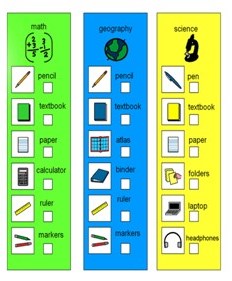Executive Functioning deficits can impact individuals
with Autism and a variety of other disabilities including but not limited to
Attention Deficit Disorder, ADHD, Intellectual Disabilities, Specific Learning
Disabilities, Traumatic Brain Injuries, and Anxiety Disorders. Difficulty with
executive functioning can occur at any ability level. This can often be
frustrating and confusing when working with students who are academically
bright or gifted because they still lack skills essential to success. Directly
teaching strategies and skills to address executive functioning skills is vital
to supporting these students and is an important step in preventing them from
becoming overwhelmed with the various demands throughout their day.
Executive Functioning deficits can impact these six
areas:
1. Planning
and Organization
2. Attention
and Impulse Control
3. Memory
4. Emotional
Regulation
5. Flexibility
6. Problem
Solving
Because Executive Functioning is so important and we see so many of our referral students struggling in these areas we are launching a brand new blog series dedicated to providing strategies for addressing these deficits. Introducing the Executive Function Forum!
Our first installment will be dedicated to strategies for directly teaching planning and organization skills. Individuals who struggle with planning and organization
often have difficulty with keeping track of their materials and assignments. They
may struggle with processing speed. This deficit can also impact school
performance because the individual may have difficulty with reading
comprehension and event sequencing, note taking, writing coherent sentences or
paragraphs, or solving multi-step equations or word problems. This may also
impact their ability to organize their free time.
Here are some great strategies for supporting students
who need help with planning and organization:
Supply Organization Visuals
Physical organization of materials and supplies can be a big challenge for our students which can make remembering what materials are needed for a specific subject or assignment more difficult and often leads to time wasted looking for supplies.
 |
| Annette Stine Kyle Elementary, Troy |
30 Second Rule
Provide students with 30 seconds of wait time for responding and following directions. This provides time to process what has been said and plan for what to do next. This is especially important for students who also have auditory processing deficits or difficulty with auditory stimulation.
Color Coded Supports
Color coding can provide a visual cue to help students categorize information for retention and for later retrieval. A great support is the use of color coded lists for organizing materials for different subjects.
Color coding can also be used when organizing new concepts or vocabulary words.
Additionally, many AAC programs use color coding to organize vocabulary within the program.
Graphic Organizers
Graphic Organizers help students with organizing their thoughts and planning for written assignments.
 |
| Kim Hampton Broadway Elementary, Tipp City |
One of our favorite resources for graphic organizers is I Hate to Write. Click on the image for more information.
Work Organization Systems
Task completion can be made easier with the use of a work organization system which lets the student know exactly what work needs to be done.
 |
| Traci Parker Forest Elementary, Troy |
 |
| Vicki Gomes Miami East Intermediate, Miami East |
 |
| Laurie Maravetz Schaefer Middle School, Springfield |
 |
| Bobbi Jo Chapman Snyder Park Elementary, Springfield |
Work Plan Template
For some students, a more advanced system can be used to organize assignments so they know what they are expected to complete. Individual organizers or class-wide templates can be used.
 |
| Emily Ottmar Stevenson Elementary, Mad River |

 |
| Robbie Whorton Trotwood Madison High School, Trotwood |
Agendas
For homework assignments, an agenda is an excellent support for planning what needs to be done at home. We love this example because it provides additional reminders for upcoming tests or projects and has a space for marking what needs to be taken home to complete the assigned homework.
Free Time Choice Boards
Many of our referral students struggle with planning for leisure or down times so having a choice board for what activities are appropriate during this time can be an effective support.
 |
| Emily Ottmar Stevenson Elementary, Mad River |
 |
| Leslie Mann Smith Middle School, Vandalia |
For older students, multi-step projects and assignments can be increasingly difficult to organize and plan for. Often, students need supports for planning the steps required to complete the assignment as well as supports for organizing the time needed to complete each step. The supports below may benefit these students:
Task Analysis for Projects
For some students, staff may provide a task analysis for the student to complete in the order provided.
Eventually, students need to develop the skill of performing their own task analysis to determine what steps need to be completed. We love the resources below which can be accessed through clicking on each image.
Using the ladder, the student can set a goal (finished assignment) and then use the rungs of the ladder to write each step needed to complete the final product.
 |
| Teaching Kids to Thrive Debbie Silver & Dedra Stafford |
Project Mapping uses post-it notes, a calendar, and a graphic organizer to break a project into steps, assign a due date, and visually map out if the step needs to be started, has been started, or is completed. The video below does a great job illustrating this process.
FLIPP The Switch
Sheri Wilkins & Carol Burmeister
Gantt Chart
Gantt Charts are an excellent time management tool. They visually organize the time needed to complete the steps of an assignments or multiple assignments.
When first teaching time management, a great tool to use is this Time Manager worksheet where students can write tasks and compare estimated times needed to complete with actual times. Click on the image to be redirected to the site.
 |
| Teaching Kids to Thrive Debbie Silver & Dedra Stafford |













No comments:
Post a Comment